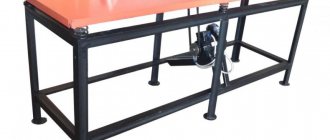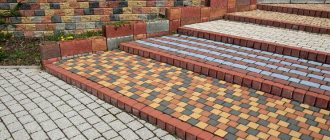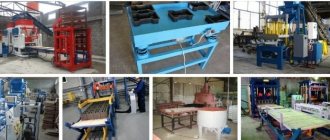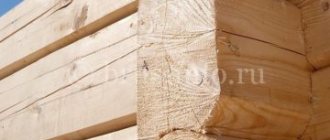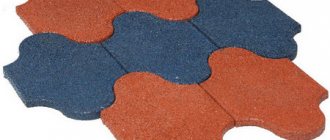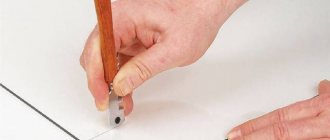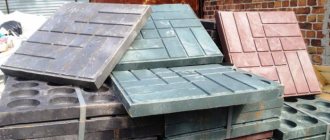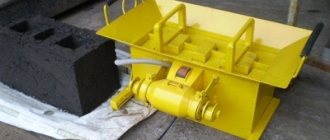Paving slabs are in excellent demand as a beautiful, durable and relatively inexpensive material for arranging paths and sidewalks.
It is equally successfully used both on the scale of one site and on a city scale.
With the right approach to business, the production of paving slabs can become a very profitable type of business.
Such production will not require large investments, and the use of special equipment will help ensure the production of tiles of the highest quality, in no way inferior in performance to the products of large industrial enterprises.
Tile production technologies
Before you finally decide on the choice of a machine for producing tiles, you should clearly understand what technologies for its production currently exist. There are two of them:
- Vibration pressing. A concrete solution with a low moisture content with constant vibration is placed between a punch (an element that exerts pressure on the working mixture) and a matrix, which determines the shape of the future product.
- Vibrocasting. Here, a more liquid concrete mixture is used, which is poured into special forms and subjected to vibration until they are filled evenly.
Depending on the methodology, the design of machines for the production of paving slabs may differ slightly.
Paving stone manufacturing technology
There are two technologies for making paving stones - vibropressing and vibrocasting. Each of the technical methods has its fans and opponents. However, it is worth noting that paving stones produced by vibration casting, that is, using a vibrating table, have fairly high quality indicators of the surface of the product - it is smooth and beautiful.
Paving stones produced using a vibropress method have a fairly rough surface on which water can accumulate, which, when frozen, will lead to the destruction of the product. At the same time, the vibropress method, with the right technology, allows you to obtain a more dense tile base.
Vibratory casting requires a lot of human labor, but a vibratory press requires very little. Equipment for vibrocompression is many times more expensive, however, products obtained in this way are valued higher.
Unfortunately, it is impossible to combine both methods into one, so everyone must choose what is a priority for him. There is also equipment for the production of rubber paving stones, but the volume of consumption of such material is less, so many people make paving stones from a concrete mixture.
By choosing the right equipment for the production of plastic windows, you can open a very profitable business.
Here you will find a list of equipment needed to make keys.
Vibropressing machine
The simplest machine for the production of paving slabs using the vibration pressing method is a durable metal frame on which a loading device, a table for the unloading plate, a punch, a matrix and a small electric motor that is responsible for vibration are attached.
Professional machine for making paving slabs
The most popular industrial models are Tandem, Tandem-2, RPB 1500. These machines are compact, do not have complex mechanisms, and can be serviced by semi-skilled workers.
As a rule, the machine comes complete with several types of dies, which makes it possible to produce a wide range of paving slabs.
What equipment is used to make paving stones?
For the production of vibropressed paving stones, as a rule, equipment is used, which is a complex of a concrete mixer, a vibropress, a molding table, as well as automatic conveyor belts. This production is as automated as possible and, as mentioned above, requires minimal human labor. However, there are also hydraulic installations that have a low price, but require full human participation.
Popular models of brick making machines
The Prima vibrocompression line is a fully automated mini-plant for the production of paving stones. It is an ideal equipment for casting paving stones, transporting them and stacking them. Such equipment is quite expensive, but the actions it performs are worth it. This line is capable of producing not only paving stones, but also many other concrete products.
Vibropress for the production of paving stones Tandem-2 is a stationary vibropress that allows you to produce up to 1,500 blocks in one shift. It has high production values, which have made it very popular in the market.
The MWP 03 brick making machine is a semi-automatic model that allows human intervention. However, he does most of the work himself.
For paving stones made by vibration casting, a set of equipment is needed, and the process of making paving stones itself will require constant human participation. The technology for producing paving stones using the vibration casting method requires the following equipment:
- Vibrating tables;
- Concrete mixers;
- Forms for filling;
- Baths with heated water;
- Special forms;
- Trolley or forklift.
Without the presence of any element from the list, the paving stone production line will be incomplete, so the production of paving stones will become impossible or will not be able to provide the desired volumes.
Vibration casting machine
This machine is a flat metal table, firmly mounted on a metal spring suspension. Vibration is provided by an electric drive, the power of which should be directly proportional to the size of the table and, as a consequence, the number of simultaneously processed forms for the concrete mixture.
Vibrating table for vibratory casting
A small compact machine can easily fit into an ordinary garage, and in one working day it can produce about 1000 pieces of finished products, which is enough, on average, to cover a sidewalk with an area of 20 square meters.
It is not necessary to buy paving slabs; you can make it yourself. Manufacturing paving slabs is a technological process from start to finish.
Detailed instructions for laying paving slabs on sand are described here.
The recipe for making concrete paving slabs is described in detail in this topic.
Which machine is better - factory or homemade?
You can find many arguments in favor of choosing one solution or another. Thus, the production of a homemade machine will cost the owner much less than buying a factory model.
However, home-made devices also have some disadvantages, the main one of which is the uneven pressure of the poison, which can negatively affect the performance characteristics of the produced tiles. Working with such a machine will require a specialist to have certain skills.
Homemade table
A vibration casting machine is more accessible for self-production. It is enough to weld a strong frame, fasten a table with sides on springs and adapt an electric motor for vibration. The tiles produced on such a device will practically not differ from industrial products.
With vibration pressing the situation is somewhat more complicated. The frame structure is made in exactly the same way, but the matrix and punch will require considerable precision in manufacturing. You will definitely need accurate drawings and professional cutting and bending tools. Serious experience working with metal will not be superfluous.
How to make molds for paving slabs
Typically, tile molds are made from polyurethane or silicone. Factory machines come with a certain set of ready-made shapes. However, they can be purchased separately, although such a purchase will be quite expensive.
Those who prefer to do everything with their own hands can easily make the molds themselves. For this you will need:
- polyurethane;
- hardener;
- sample tile;
- gypsum.
DIY plastic mold for paving slabs
Gypsum may be needed if standard tile shapes are not suitable and you want to make your own tile configuration.
So, take a ready-made sample tile or your own gypsum blank and fill it with liquid polyurethane mixed with a hardener. After complete drying, the finished form can be easily removed from the sample.
Some pro tips
In order for the produced tiles to meet all quality standards, one machine, no matter how good it is, will not be enough. It is important to strictly follow the technology and take into account numerous nuances:
- The vibration should not be too strong. This can compromise the integrity of the concrete mass and significantly reduce the strength of the products.
- The press must apply uniform pressure to each area of the tile surface.
- It is advisable to add crushed stone and special plasticizers to the concrete mixture. The tile will be more durable.
- When choosing cement, you should give preference to brands no lower than M500.
- The tile production room must meet certain standards for temperature, humidity, etc.
- After each production cycle, the workpieces must be thoroughly dried. This can be done in special dryers.
- If you plan to produce large volumes of tiles, you should worry about preparing the premises for storing finished products in advance.
Thus, to organize a full-fledged business for the production of paving slabs, it is perhaps worth giving preference to purchasing ready-made equipment from one of the modern manufacturers. For the production of small batches of tiles, a machine made by yourself is quite suitable.
Creating a mold for paving slabs with your own hands will allow you to create a unique design when decorating recreation areas and paths.
We will tell you in this section what size of profiled sheet to choose for a fence.
How to make a vibration table with your own hands
To produce small volumes of paving slabs, you can build a block vibrating table with your own hands. Convenience of work is ensured by a unit with a tabletop 600*800 mm, 90 cm high.
Metal parts used in the work may be used
Design features of the base:
- the legs are made of pipes with a square section of 40*40*1.5;
- soles 55*55 mm, 1.5 mm sheet;
- upper crossbars 40*20*1.5;
- lower crossbars 20*20*1.5;
- M14*40 bolts are welded in the corners, on which the springs and table top will be installed;
- a 1.5 mm sheet is welded on the side - for fixing the socket and switch.
Design features of the tabletop:
- the surface is made of steel sheet 8.0 mm, 600*800 mm;
- the frame can be made of pipe 40*40, 40*20 mm;
- to install the springs, bolts are welded in the corners;
- In the central part, channel No. 8 is welded, with four holes Ø15. It is convenient to drill holes in three stages - f3, f6, f15. The engine will be attached to the channel (using nuts and bolts);
- four springs. You can take springs from any old car, with an internal diameter of 21 mm, an external diameter of 27 mm, and a length of about 65 mm. If you place scraps of rubber hose and then springs on the prepared bolts, they will be more stable and provide ideal vibration.
Choosing a vibrator
The unit can be removed from old household appliances or purchased from the factory. The device must operate from a standard 220 V network. Optimal power is 0.9 kW . Fastening to the channels is done using 100*16 mm bolts, washers and engravers.
After installation, the driving force is adjusted (if there is a factory device). The vibration amplitude should be approximately 1.0 mm . You will also need an extension cord, socket, switch, plug. Electrics must be grounded.
It is recommended to paint the assembled product (welding is used in the work) with metal paint to prevent rust. The sides are welded around the perimeter of the table for ease of work, for which you can use available material - a thick rod or tube.
The advisability of purchasing professional equipment depends on what goals the master is pursuing. If making tiles is necessary for paving two or three paths, you can make do with available materials and minimal costs. If you plan to carry out a wider range of work or organize your own production line, it is advisable to purchase professional units.
The production and operation of equipment for the production of paving slabs (vibrating table) is shown in the video:
